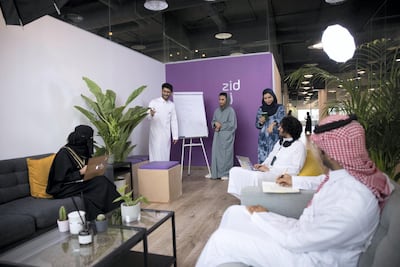Zid, a Riyadh-based start-up that helps businesses to set up online shops, is expanding across the GCC and Egypt after raising $2 million through an early stage funding round led by the UAE’s Global Ventures.
The company will use the capital to boost its presence in Saudi Arabia and expand into newer markets such as the UAE, Kuwait, Oman, Bahrain, Qatar and Egypt, co-founder and chief executive Sultan Al Asmi told The National.
Other investors in the round included Elm and Arzan Venture Capital.
“There is a huge potential for growth,” says Mr Al Asmi. “We can simplify starting a new business digitally and we can help traditional merchants upgrade their presence to online and offline at the same time.”
Online shopping gained momentum after governments around the world introduced movement restrictions to stop the spread of the Covid-19 pandemic. A number of retail companies in the region have invested heavily in their own online platforms to increase sales.
The Zid platform, which was unveiled in 2017, allows retailers to set up their own online shop through a few clicks. It integrates payment, warehousing and delivery systems to make it easier for companies to move online.
Mr Al Asmi says 80 businesses signed up for its services in its first year of operations. This jumped to about 700 businesses in the following year and the company now has more than 5,300 shops that trade through its platform to sell products ranging from clothes to perfumes and food products.
“In 2017, merchants did 4m Saudi riyals [$1.06m] in business and in 2018, we had 600 to 700 merchants who did 40m riyals, generated from 118,000 transactions. In 2020, we exceeded 2 billion riyals in business, with more than four million transactions.”
The company’s revenue also grew as the number of companies registered on the platform increased.
“In 2020, we achieved 1,000 per cent more revenue when compared to 2017,” he says, without giving a figure for the total revenue generated by the company during either period.
The company hired more customer-facing staff last year to boost online sales as demand grew during the pandemic.
“This team is about eight people. We go with them [customers] one to one. We go with them on webinars, create content, customise the content, do the analysis, understand what the obstacles are and try to facilitate and support.”
The company has raised $9m so far, including $2m in a 2019 round led by Riyadh-based Elm venture capital. It intends to raise additional funds to help it grow further but this “will be next year”, says Mr Al Asmi.
Start-ups in the Mena region secured record funding worth more than $1bn in 2020, according to data platform Magnitt.
The UAE, the Arab world’s second-biggest economy, had the lion’s share and was ranked first in terms of the number of deals while start-ups in Saudi Arabia, the Arab world’s biggest economy, clinched 18 per cent of the region’s deals and 15 per cent of total funding.
The kingdom is also supporting start-up companies with financial aid and other resources.
Saudi Arabia unveiled 142 stimulus initiatives worth more than 214bn riyals after the pandemic began last year. The Saudi Industrial Development Fund also provided $4.5bn in loans to mostly small and medium enterprises last year to support them amid the health crisis.
One of the challenges in the first two years of operations was finding the “right kind of talent”, says Mr Al Asmi.
“Nowadays, we have a lot of good talent in Saudi Arabia. Also, we are having customers who do not need any help and who are sophisticated enough to start and grow on their own.”
Zid currently employs 150 people. Most of them are in Riyadh but others work remotely from Egypt, the US, Vietnam and Syria.
The company offers two different e-commerce packages for businesses seeking to grow their online sales. A basic package, which costs 230 riyals a month, includes services such as registration of the domain name and handling of online payments.
A “growth” package, which costs 460 riyals a month, offers consulting services, accounting systems and improves visibility on Google Maps. On top of this, other services such as digital marketing, photography, packaging and co-working space are offered for a fee.
Mr Al Asmi owned gift and flower shops before he started Zid with his friend Mazen Al Darrab.
The company first focused on small businesses that were either working from home or had a single shop but lacked the resources or expertise to build their own websites. The platform was later expanded to house bigger businesses with more than one branch that were able to pay for additional services.
The potential for growth is “huge” in Saudi Arabia as many people shift to online shopping, says Mr Al Asmi.
However, Zid faces competition in the market from “one local company and a few regional companies”. Although only 4 per cent of total retail sales in the kingdom are made online, the medium “is fast catching up”, he says.
In a survey published last week, Saudi Arabia was identified by Mastercard as a country where e-commerce is growing rapidly, with the number of online shops that customers are buying from increasing by 33 per cent in 2020.
Q&A with Sultan Al Asmi, co-founder and chief executive of Zid
What is your vision for the company?
Being the agent of change for retail in emerging markets and offering a seamless experience and full-fledged service. All of the emerging markets in the region are in great need of such services and there is a promising future all over the world for modern retail. We aim to be the enabler and a booster for this change.
What new skills have you learnt in the process of launching your start-up?
Self-discipline, focus, teamwork and team building.
How has Covid-19 affected your business?
It has helped raise awareness of e-commerce and accelerated a transformation in the market. It has also helped innovation in the supply chain to overcome challenges.
Where do you see the company in five years?
We see Zid levelling up retail online and offline in several emerging markets. We are building FinTech, logistics and a gig platform within Zid.
What is your mantra for success?
Huge success is made by teams, not individuals.
Profile of Zid
Founders: Mazen Al Darrab and Sultan Al Asmi
Based: Riyadh, Saudi Arabia
Founded: 2017
Number of employees: 150
Sector: e-commerce
Funding: $9m from various investors including Saudi Arabia’s Elm Venture Capital, China’s MSA Capital, the UAE’s Global Ventures and Kuwait’s Agility Ventures and Arzan Venture Capital.
Countries: Currently Saudi Arabia, with future plans to expand across the GCC and Egypt



